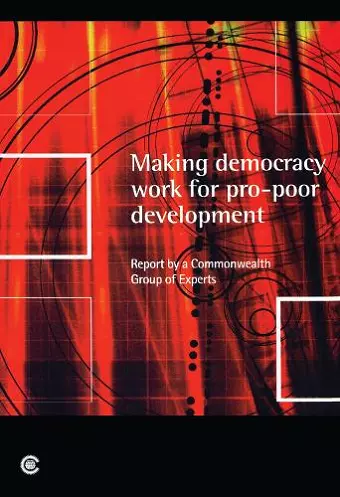Making Democracy Work for Pro-poor Development
Report of the Commonwealth Expert Group on Development and Democracy
Manmohan Singh author Jocelyne Bourgon author Richard Jolly author Martin Khor author Robert Champion de Crespigny author Akinjide Osuntokun author Salim Ahmed Salim author Tuiloma Neroni Slade author
Format:Paperback
Publisher:Commonwealth Secretariat
Published:1st Oct '03
Currently unavailable, and unfortunately no date known when it will be back

Starting from the premise that democracy is more than simply a matter of universal suffrage and the holding of regular multiparty elections, and that development is about much more than growth of GDP, this Report focuses on how to make democracy work for pro-poor development and on development policies that in themselves uphold and promote democratic values. It argues that development and democracy are not only goals in their own right but must also be mutually reinforcing. Pro-poor development recognises that people need the ‘capabilities' to do and be the things that they have reason to value, such as being adequately nourished, having equitable access to justice and participating in decisions that affect their lives. It also recognises that development policies aimed at the general populace may have a more limited positive impact on particularly disadvantaged groups. Such groups need to be identified (for example, in terms of gender, ethnicity, religion, age or occupation) and policies need to be specifically designed for improving the lives of the poor. The Report argues that governments, the private sector, civil society and the international community each have a vital role to play in delivering development and democracy, and calls for responsibility, partnership and concrete actions from all these actors. Without responsibility on all these levels, development and democracy will remain rhetoric rather than become reality. Prepared by the Commonwealth Expert Group on Development and Democracy at the request of Commonwealth Heads of Government, the Report contains a number of recommendations for action at the national and international levels. It will be of interest to policy-makers, multilateral and bilateral agencies, the private sector, civil society organisations and all those committed to development, democracy and the achievement of the Millennium Development Goals.
'a valuable resource to anyone interested in education planning and policymaking in developing countries.' - Compare, Volume 40 Issue 1 2010. Compare, Volume 40 Issue 1 2010. 'An excellent book! It comes highly recommended for education researchers and teachers at the primary education stage.' - ESCalate (Read the full review at http://escalate.ac.uk/5365). ESCalate
ISBN: 9780850927818
Dimensions: unknown
Weight: unknown
130 pages